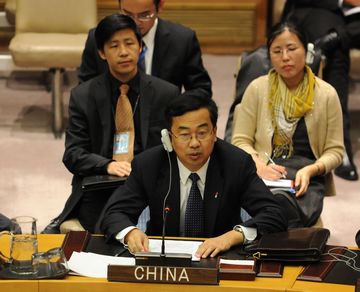| Statement by Ambassador Wang Min at the Security Council Open Debate on Piracy |
| 2012-11-19 05:29 |
|
Mr. President, I would like to thank India for taking the initiative to hold today's open debate on piracy. I wish also to thank Deputy Secretary-General Eliasson for his briefing. Piracy is a common scourge facing the international community. Over recent years, pirates have carried out rampant activities off the coast of Somalia, in the Gulf of Aden and in the Gulf of Guinea. They are increasingly taking to it as a business model. Their all-weather operational capacity has been further strengthened, the area of attacks has further expanded, and their activities are becoming more violent. Acts of piracy have not only undermined the safety of international navigation but have also affected normal trade and economic activities. In addition, they have made more vulnerable the situation of certain areas that already pose threats to international peace and security. The international community must pay close attention and strengthen cooperation, and address the phenomenon accordingly. In that context, I would like to make the following comments. First, it is important to strengthen international cooperation in our fight against piracy. Such international cooperation has achieved marked results, making piracy attacks less successful than they have been. We hope that the international community will continue to be guided by the United Nations Convention on the Law of the Sea and relevant international law and will persist in strengthening cooperation and coordination through coordinated actions designed to further combat piracy. In such activities the international community must fully respect the sovereignty and territorial integrity of the countries concerned. We support the continued role of the United Nations in coordination in that regard. It is important to enrich and improve cooperation mechanisms, strengthen information-sharing and effectively prosecute and try those involved in piracy so as to forge synergies in our fight against it. Secondly, it is important to strengthen the capacity-building of relevant countries and regional organizations in fighting piracy. We support the initiatives taken by the countries of the Gulf of Guinea, which include formulating national strategies, improving international legal regimes, strengthening good governance and enhancing naval, judicial and law enforcement capacities. All of those efforts will enable them to play a better role in preventing and fighting piracy. We commend the Economic Community of West African States, the Economic Community of Central African States and the Commission of the Gulf of Guinea for having developed a regional strategy for fighting piracy and on the establishment of a regional centre for coordination. We call upon the international community to be more responsive to the capacity building efforts of relevant countries and regional organizations by providing more financing and technical assistance. Thirdly, it is important to take a holistic approach and address both the symptoms and root causes of piracy. Piracy comes about as a result of deeply rooted economic and social factors. Although piracy takes place at sea, its genesis lies on land. The international community must take into account considerations of specific conditions of specific areas and address the problem at its source so as to eliminate the conditions upon which piracy thrives. As far as Africa is concerned, poverty and economic and social underdevelopment are the root causes of piracy. We call on the international community to redouble its efforts to provide assistance to African countries and the least developed countries and to play a better, more active role in achieving stability, eliminating poverty and attaining sustainable economic and social development. China has actively participated in the international fight against piracy. Since January 2009, the Chinese navy has dispatched escort convoys to the Gulf of Aden and the coastal areas off Somalia. By early November this year, China had dispatched in total 13 escort formation convoys, totalling 34 vessels. They have carried out 515 operations, providing escorts to 4,901 vessels, of which half were foreign vessels, and they have achieved a 100 per cent success rate. China is willing, on a voluntary basis and with coordination on an equal footing, to continue strengthening coordination and information-sharing about military operations with the parties concerned. China has also, within its capacity, provided assistance to the countries in the Gulf of Guinea in their fight against piracy. We are ready to continue to strengthen cooperation and coordination with the countries concerned in order to play a more active and constructive role in our fight against piracy. Thank you, Mr. President. |
| |||||||||||||
| |||||||||||||
